Final report for YENC17-118
Project Information
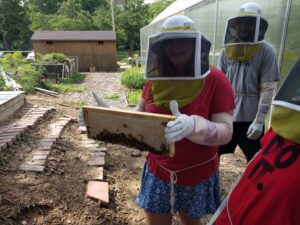
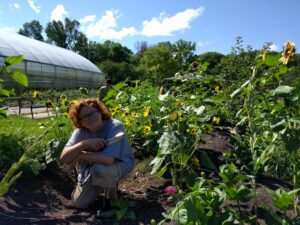
Over the course of the year, Youth Service Corps (YSC) members received hands-on education about honeybee hive management with the help of a local farm/apiary, Bee Wise Farms, LLC. YSC members learned how to handle hive frames, how to react properly with bee swarms, techniques to calm bees down, pests and diseases that can affect hives, how to properly nourish bees and how to safely collect honey, and also got to try several different honeys in order to gain awareness of how local plants and pollen can affect the taste of honey. The overarching benefit of learning about bees and other pollinators for YSC is that it gives a larger understanding of the natural world in the lens of the symbiosis between insect and plant. YSC plants and maintains a large shared urban garden called Edible Park, and understanding the deeper relationship between plants and animals is a key factor in establishing a solid foundation in gardening knowledge, and is very much at the heart of what this project was intended to accomplish.
As a result of our work with Bee Wise Farms, 18 students between the ages of 11-17 got to see first hand the complex inner workings of a beehive. Many of the students reported an increased respect for bees and that they no longer feared stings as much, due to seeing how effective staying calm can be when surrounded. 100% of students surveyed reported that they increased their knowledge of beekeeping, and when asked if knowledge about how plants and pollinators interacted had increased, 100% reported yes. Further, 85% of youth surveyed reported to the positive when asked if their knowledge about honey production increased, and 90% stated that their awareness of other pollinators beyond bees had increased. Moreover, 80% of youth reported increased awareness of pests, problems and diseases facing modern beehives, and 90% of students surveyed said they now possess a deeper awareness of how important pollinators are to agriculture in the U.S. overall.
During the spring and summer, YSC members planted and tended to more flowers than any season previous; focusing on pollinator favorites and anything we had available. Borage was the hit of the season; it was constantly buzzing with bees, and the flowers also became a favorite snack of YSC members as well, once I convinced them that the flavor was actually worth trying. We even made a borage-infused lemonade at our Park Cart stand this year, and it sold quite well.
Looking back on the year, the partnership with Bee Wise Farms was great for YSC and Edible Park in general, and we plan to expand on it in the coming years. Having a hands-on activity involving bugs is usually a hit with kids, and it worked well for YSC. Most of the YSC members already have a good foundation of sustainable agriculture practices and integrated pest management, and adding understanding about pollinator interactions gives them a very well-rounded base of knowledge for urban agriculture.
Overarching Goal - Youth Service corps members, youth from 11-17 years, will engage in service learning projects focusing on food access in the northeast quadrant of Michigan's capital city. The following objectives were designed to meet the goal:
Objective 1 Construct and Deliver Garden-in-a-Box Kits - Youth constructed and delivered seven Garden-in-a-Box Kits to the homes of neighbors with limited gardening experience, income, and/or mobility.
Objective 2 Continue the Fruit Tree Project - Youth mapped, harvested, and re-distributed fruit from a few fruit trees in private yards in order to minimize food waste.
Objective 3 Expand 'Edible Park'- YSC members expanded the Edible Park (in Hunter Park) by planting lots of ground cherries and strawberry bushes and plants (in lieu of fruit trees), many more flowers than ever before, over 20 perennial herbs, and 50 annual crops. The installation of several Hugelkulture beds was a particularly appealing activity for these youngsters.
Objective 4 Create healthy snacks to sell form the YSC Park Cart at the Allen Farmers Market - YSC Members held 35 sessions in our commercial kitchen, creating healthy snacks to sell at our Farmers Market. Highlights were herb-infused lemonade and ground cherry granola bars.
Objective 5 Learn about Beekeeping at the GardenHouse -The focus of this grant, beekeeping was addressed by having YSC members work with Bee Wise Farms to install, care for, tend and harvest from the YSC hives.
Cooperators
- (Educator)
Educational & Outreach Activities
Participation Summary:
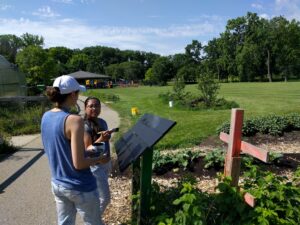
During the course of the year, Adam and Lacey Ingrao of Bee Wise Farms led 3 hands-on beekeeping sessions with Youth Service Corps members, in which they were allowed to handle frames from Langstroth hives, learn how to properly wear the vales and protective gloves necessary, and quite a range of facts about bees and pollinators in general. Adam Ingrao is also a PhD in Entomology at Michigan State University, so the depth of his knowledge on the subject is quite impressive, as is his partner Lacey's (although she is not a PhD, just passionate).
Beyond the Bee Wise sessions, YSC members were given a lecture about Integrated Pest Management in the early part of our garden season, and just by being in the garden, we often talked and debated about insects and their contributions (or lack thereof) to Edible Park. Arachnids were often a point of contention, since much innate fear was present in some YSC members.
Curricula, worksheets and literature concerning pollinators was crafted by the Youth Coordinator and Gardening Educator Leah Kate McKenney and presented throughout the growing season in a discussion and lecture format. Recent concerns in pollinator populations and diseases within them were discussed, as were potential solutions to these problems. YSC members also visited a local nature center's pollinator garden as well as a demonstration garden in the city focused on teaching the public about gardening and pollination.
YSC's pollinator studies and activities were shared with the public via a weekly Allen Neighborhood Center e-newsletter, our Eastside Neighbor quarterly publication, and a weekly YSC focused e-newsletter. We also used our social media outlets such as Facebook and Instagram to share our apiary activities. Local media outlets were also in touch, and ANC Executive Director Joan Nelson shared our story with local radio stations on two occasions. YSC members also hosted Collection Days at Edible Park on the last Fridays of summer months as well, an opportunity to have an "open garden", so to speak, to spark interest in our gardening activities and also increase food access to our immediate neighborhood.
Learning Outcomes
Project Outcomes
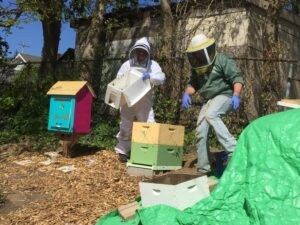
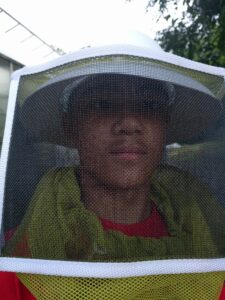
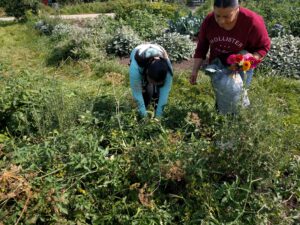
Through YSC member's sharing of experiences and retelling of the day's activities in beekeeping, Garden-in-a-Box installation, organic gardening in Edible Park , and other activities that NCR-SARE helps support, with their parents, a handful of YSC members have reported that they either garden at home now, eat more fruits and vegetables, and think about their food purchases a little more now. YSC members who take home extra plants we grow in the spring often report how excited they and their parents are that they can grow their own food, which is always more flavorful than store-bought. YSC members have reported that parents are less likely to use pesticides or fertilizers on their plants at home when they realize that Edible Park is grown 100% organically, and grows well this way.
While a great many YSC members enjoy watching their efforts in the garden blossom into a tangible, edible commodity, I believe this year's biggest success story came from our beekeeping sessions during the summer. Many of the YSC members are from lower socioeconomic families, and a few have never traveled that far outside of the city limits. Seeing a working beehive and finding out how many bees, how much honey, and how far bees travel in a day collecting pollen was quite the surprise to most of them. One student in particular, whom is usually quite reserved, seem to retain facts he heard about beekeeping quite well and also got excited when we could handle the frames and interact with the bees (especially the honey tasting part). Even though he is at that age where nothing is cool enough for him, he told me he really enjoyed the beekeeping and found the complexity of the hives very intriguing.